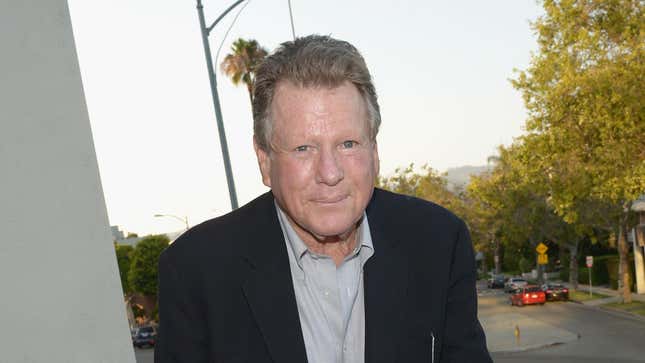
Ryan O’Neal has died. As first a TV star, and then an Oscar-nominated actor—for box office smash Love Story, in 1970—O’Neal had a celebrated run as a performer throughout the 1960s and ’70s, before both his public reputation and his career were tarnished by a mixture of diminishing returns, box office failures, and allegations of abusive behavior from the women and children in his life. Per TMZ, O’Neal’s death was confirmed on Friday by his son, Patrick. O’Neal was 82.
Born into a Hollywood family—his father was prolific genre screenwriter Charles O’Neal—the younger O’Neal initially trained as a boxer in high school, before getting into acting, ironically, after the family moved from California to Germany for a few years in the 1950s. A series of guest star stints on TV in the early 1960s led to a casting as a regular in ABC prime-time soap Peyton Place, which served as a launching pad for a number of its young stars—including O’Neal.
In 1969, O’Neal got his first starring role in a movie, appearing as the lead in poorly received Elmore Leonard adaptation The Big Bounce. But it wasn’t until the next year that his career truly exploded, when he starred as young would-be lawyer Oliver in Arthur Hiller’s Love Story, which swiftly became one of the highest-grossing films of all time. Starring opposite Ali McGraw, O’Neal garnered the Oscar nod for his role, which evolves from young lover to soon-to-be widower as the film’s melodramatic (but undeniably affecting) narrative progresses.
Love Story’s success paved the way for the next decade of O’Neal’s career, which was marked by a series of critical—if not always commercial—successes. Several of these came at the hands of director Peter Bogdanovich, who cast O’Neal as the male lead in films like What’s Up Doc?, Nickelodeon, and 1973's Paper Moon—the latter of which also starred O’Neal’s then 10-year-old daughter Tatum, in a star-making turn as a young con artist. Other directors who worked with O’Neal during this era included Walter Hill (who praised the actor’s work on his 1978 crime thriller The Driver) and Stanley Kubrick, who placed O’Neal in the title role of his ill-fated historical epic Barry Lyndon.
Despite appreciation of the film’s gorgeous look, and a later critical re-appraisal of the movie by modern audiences, Lyndon played a major part in killing the idea that O’Neal was an automatic box-office draw—something hammered home when he decided to make Oliver’s Story, a sequel to Love Story, in 1978. The film, co-starring Candace Bergen, was a failure from both a critical and a box-office perspective, and marked a major decline in O’Neal’s career over the next several years, which saw him spend far more time in comedy than drama, and often to rough effect.
More pertinently, the 1980s also saw more and more stories emerge about O’Neal’s personal life, few of them positive. His son Griffin publicly accused his father of physically abusing him in 1983, and would later allege that his dad forced him to use cocaine when he was just 11 years old; Tatum would later write in her autobiography that she was sexually assaulted by one of her father’s drug dealers while still just a child, and physically abused by the man himself. O’Neal was also noted for numerous affairs, despite being in a long-term relationship with Farah Fawcett; in a 2014 memoir, Anjelica Huston wrote that O’Neal physically abused her during a romantic relationship. Stretching across multiple decades, the stories paint a portrait of violent and distressing behavior, despite occasional moments of reconciliation; 2010 saw O’Neal work with Tatum for a short-lived reality show, The O’Neals, but a 2015 interview with Griffin asserted that he hadn’t seen his father for several years, ever since the elder O’Neal apparently shot at him during an altercation over the sobriety struggles of Griffin’s half-brother, Redmond, the son of O’Neal and Fawcett.
Despite it all, O’Neal continued to work up until 2017, mostly in a recurring part on Fox procedural Bones. (Playing, with some obvious subtext, the estranged criminal father of the show’s main character, played by Emily Deschanel.) O’Neal was diagnosed with chronic leukemia in 2001, and prostate cancer in 2012; no cause of death has been, as yet, revealed.